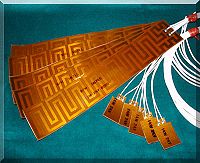Flexible Heaters
Revision as of 07:53, 27 August 2012 by PurplePen19 (talk | contribs)
Flexible heaters offer superior tensile strength and tear resistance, with precision heat distribution. They are ideal for extreme temperature environments, from -319°F to +392°F (-195°C to +200°C). Heaters are in stock standard at 0.0007” (0.2mm) thick and up to 20”x26” (.508m x .660m) areas. Watt density is 5W/in² (0.8W/cm²) standard, with units available to 50W/in² (7.8W/cm²).
Benefits
- Rugged construction provides high reliability in a wide range of heating applications and reduces need for field repair and replacement
- Optional custom profiled heat density creates a uniform heat sink temperature which can improve processing yields
- Factory vulcanization and high temperature capability allows higher wattage levels for faster processing
Features
- High temperature capability to 235°C (455°F)
- Can be factory vulcanized to metal parts without adhesive
- Resistant to many chemicals
- Not suitable for radiation, vacuum, or prolonged exposure to oil
- Most economical in large sizes
Typical applications
- Thermal developing in graphic imaging equipment
- Prevent condensation in motors or instrument cabinets
- Heat outdoor electronics
- Food service equipment
- Medical respirators
- Laminators
- Drums and other vessels
- Airplane engine heaters
Video
